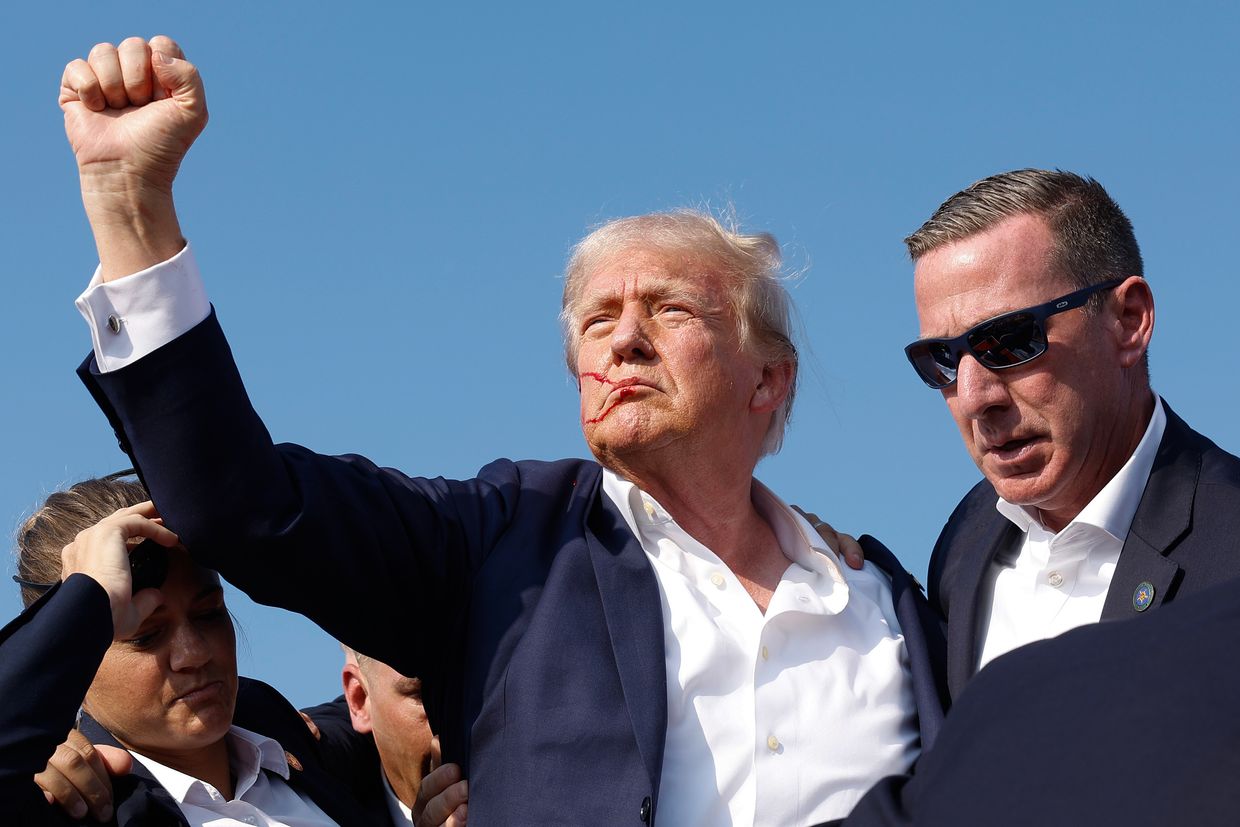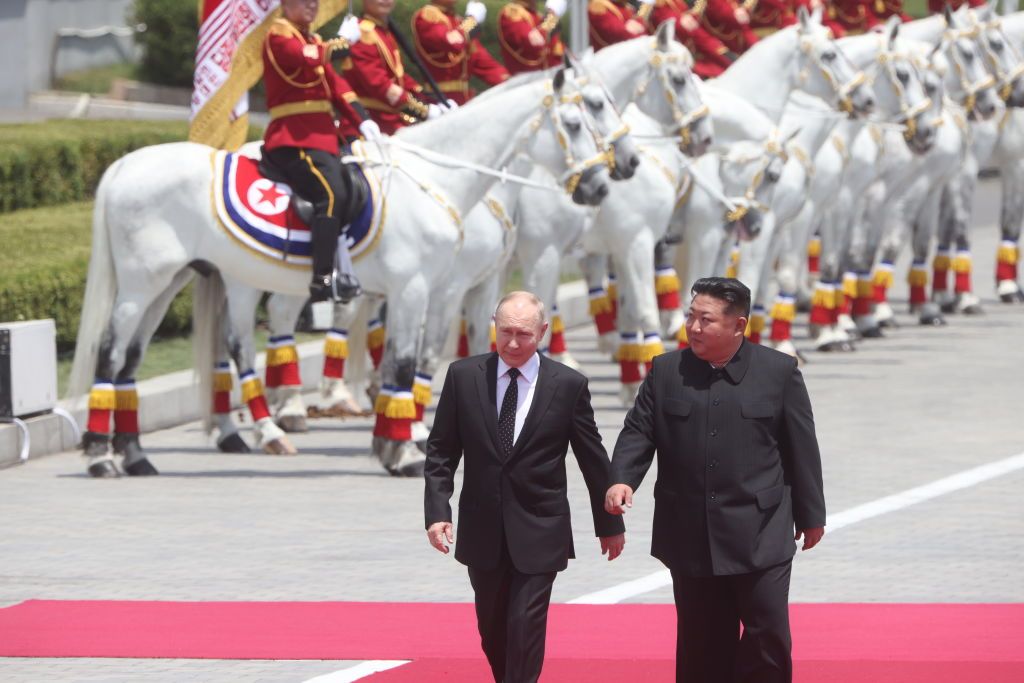Opinion: We can't lose sight of nuclear nonproliferation

North Korean dictator Kim Jong Un (L) walks with Russian President Vladimir Putin shortly after Putin's arrival in Pyongyang, North Korea, on June 19, 2024. (Gavriil Grigorov / POOL /AFP via Getty Images)

Joseph S. Nye, Jr.
Former U.S. assistant defense secretary
Avril Haines, the U.S. Director of National Intelligence, recently warned that “Russia’s need for support in the context of Ukraine has forced it to grant some long-sought concessions to China, North Korea, and Iran with the potential to undermine, among other things, long-held non-proliferation norms.”
How much does this matter? Some theorists have long been skeptical about efforts to limit the spread of nuclear weapons, even arguing that proliferation can be a stabilizing force. If the horrors associated with nuclear weapons are one reason why there have been no wars between great powers since 1945, they argue, perhaps the same effect can be replicated at the regional level. India and Pakistan developed a nuclear balance in the 1990s, and there have been no disastrous consequences so far.
But would prudence still prevail in a world of “nuclear-armed porcupines?” U.S. President John F. Kennedy did not think so. As he put it during a March 1963 press conference,
“With all of the history of war, and the human race’s history, unfortunately has been a good deal more war than peace, with nuclear weapons distributed all through the world, and available, and the strong reluctance of any people to accept defeat, I see the possibility in the 1970’s of the President of the United States having to face a world in which 15 or 20 or 25 nations may have these weapons. I regard that as the greatest possible danger and hazard.”

Later that year, Kennedy signed a treaty banning atmospheric nuclear testing, setting the stage for the 1968 Non-Proliferation Treaty (NPT), which now has 191 members. The treaty’s five recognized nuclear-weapons states – the United States, the Soviet Union, Britain, France, and China – pledged not to spread nuclear weapons, and its 186 other members pledged not to develop them. Israel, India, and Pakistan refused to sign the NPT and did develop nuclear weapons; North Korea signed the treaty but then withdrew to develop its nuclear program.
That brings the total of nuclear-armed states to nine, which is far from perfect, but much better than Kennedy predicted. Defenders of this imperfect regime argue that the rate of spread is as important as the number of states possessing the bomb, because greater predictability improves the prospect of maintaining stability. Already, Saudi Arabia has threatened to develop nuclear weapons if Iran does. If there are regional cascades of new nuclear-armed states, the probability of accidents and miscalculations would increase substantially.
Haines explicitly mentioned Iran and North Korea. Both had been under United Nations sanctions in which China, Russia, and the West cooperated. Until recently, Russia had a long history of supporting non-proliferation. Not only did it sign the NPT, but it also adopted the 1978 Nuclear Suppliers Group Guidelines, under which vendors of civil nuclear equipment agreed to exercise prudence in their export policies. Now that Russian President Vladimir Putin is becoming dependent on North Korean military supplies to sustain his war in Ukraine, however, he has ended Russia’s cooperation on non-proliferation.
While Iran has long had a nuclear-weapons program based on enriched uranium, it has gone through fits and starts in response to external pressures. The regime has been careful to keep its production of highly enriched uranium below the threshold needed to produce a nuclear arsenal. But with Russia relying on Iranian drones, China relying on Iranian oil, and former U.S. President and Republican presidential candidate Donald Trump having foolishly scrapped the Iran nuclear deal in 2018, international cooperation on non-proliferation has broken down here, too.
Moreover, some believe (probably mistakenly) that Russia would not have invaded Ukraine if the Ukrainians had kept the nuclear weapons that they inherited when the Soviet Union collapsed. If this assumption gains traction, the prospects for non-proliferation will worsen.

I am reminded of a similar situation in the past (which I recollect in my memoir, "A Life in the American Century"). Following the oil crisis of 1973, the conventional wisdom was that the world would need to turn to nuclear energy. But because many believed (incorrectly) that the world was running out of uranium, everyone set their sights on reprocessed plutonium – a by-product of burning uranium in nuclear reactors.
Forecasts at the time suggested that some 46 countries would be reprocessing plutonium by 1990. If so, the world would be awash in weapons-grade material, and the risk of nuclear proliferation and nuclear terrorism would increase catastrophically. In 1974, India became the first state beyond the five listed in the NPT to launch what it euphemistically termed a “peaceful nuclear explosion.”
Soon thereafter, France agreed to sell a plutonium-reprocessing plant to Pakistan, where Prime Minister Zulfikar Ali Bhutto had vowed that his country would eat grass before letting India develop a nuclear monopoly in South Asia. In Latin America, Germany was selling a uranium-enrichment plant to Brazil, and Argentina was looking at plutonium. As many other countries quietly explored their options, it appeared as if a nuclear-arms race was underway.
Fortunately, it never materialized. US President Jimmy Carter pursued a non-proliferation policy that succeeded in slowing the momentum. Only two additional countries have developed the bomb since the 1970s, rather than the 25 that Kennedy feared. While everyone assumed that not much could be done about proliferation, Carter thought otherwise. Thanks to his administration’s efforts, the French-Pakistani and German-Brazilian deals were scuttled. The U.S. created an international commission to study the nuclear fuel cycle, and this reduced momentum toward reprocessing plutonium and the use of “breeder reactors.”
Those harboring doubts about the viability of non-proliferation ought to consider this lesson from history. Even if proliferation cannot be stopped, it can be slowed, and that can make all the difference.
Editor’s Note: Copyright, Project Syndicate. This article was published by Project Syndicate on July 9, 2024, and has been republished by the Kyiv Independent with permission.The opinions expressed in the op-ed section are those of the authors and do not purport to reflect the views of the Kyiv Independent.











